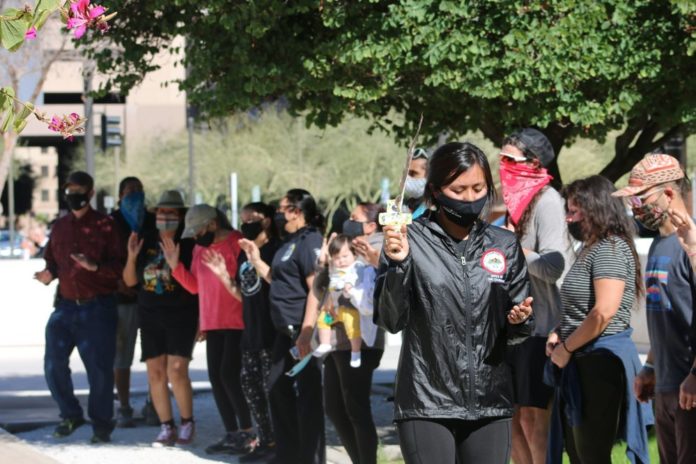
The mayor of a small community in Arizona’s copper corridor likes to think of Superior as a town with a mine, not a mining town.
Neither can be a reality if Congress passes a bill to rescind a land exchange for what would be one of the largest copper mining operations in the U.S.
Superior Mayor Mila Besich pushed members of Congress on Tuesday to oppose the bill, saying residents cannot fully realize plans for a community center, economic development, and tourism that draws on its mountainous surroundings without the mine and its financial support.
“Our strategy has always been that ore body is going to be mined at some point, and we need to be as smart as possible, and we need to actively participate in these very large and complex federal processes,” she recently told The Associated Press. “We are who we are, and mining belongs in this part of the state, whether we like it or not.”
Resolution Copper, a joint venture of global mining giants Rio Tinto and BHP, was set to receive a parcel of land in the Tonto National Forest in mid-March. Then, the Biden administration pulled back an environmental review that triggered a 60-day clock for the land exchange so it can consult further with Native American tribes that hold the land sacred.
At least three lawsuits also are challenging the land exchange, approved as part of a must-pass defense bill in 2014. Democratic U.S. Rep. Raul Grijalva of Arizona is sponsoring the bill to rescind the land exchange. Bern
Arizona Gov. Doug Ducey and the United Steelworkers union are among those who have touted the jobs that mining could bring and the revenue. The union also saw it as part of a solution to climate change in written testimony to the House Subcommittee for Indigenous People of the United States.
“Copper is an important material that will play a key role in technologies that will reduce greenhouse gas emissions and improve efficiency in ways that are necessary for a future that mitigates the worst impacts of climate change,” said the group’s legislative director, Roy Houseman Jr.
Others are concerned about the amount of water the mine would use at a time when Arizona and the broader Southwest region are locked in a drought, potentially impacting aquifers and waterways.
“How can this fit in Arizona’s long-term future?” said Shan Lewis, president of the Inter-Tribal Council of Arizona and vice chairman of the Fort Mojave Indian Tribe. “The answer is it can’t. Perhaps the mine can bring short-term jobs to the area but at what cost?”
For Fawn Sharp, president of the National Congress of American Indians, there is no compromise that would allow mining and protect a site known as Oak Flat that’s central to the spiritual and cultural wellbeing of Apaches. She said it’s unconscionable to suggest balance.
“If we can monetize our spiritual health, if we can monetize that which the creator gifted us, if we can monetize our very identity, clearly that would create a path where Indigenous peoples would risk even surviving another generation,” said Sharp, who also is president of the Quinault Indian Nation.
Besich said she can’t refute what tribes hold sacred, just as tribes can’t speak for Superior. She and several other mayors and elected officials wrote to President Joe Biden last month, saying they’re “gravely concerned” that delaying the copper mine will cause irreparable harm to the region and their way of life.
She said she’s aware of the risks associated with mining, and the boom-and-bust nature of the industry, hence the focus on diversifying the town’s economy.
So far, Resolution Copper has invested in the town’s school, a community and business center, and advertising, Besich said. Without the financial boost from the mine, Superior will have a harder time building its reputation as a tourist spot, buying property, restoring buildings, and keeping its residents at home.
“This would really set us back probably two decades at this point if we had to start all over again,” Besich said.
Republished with the permission of the Associated Press.













